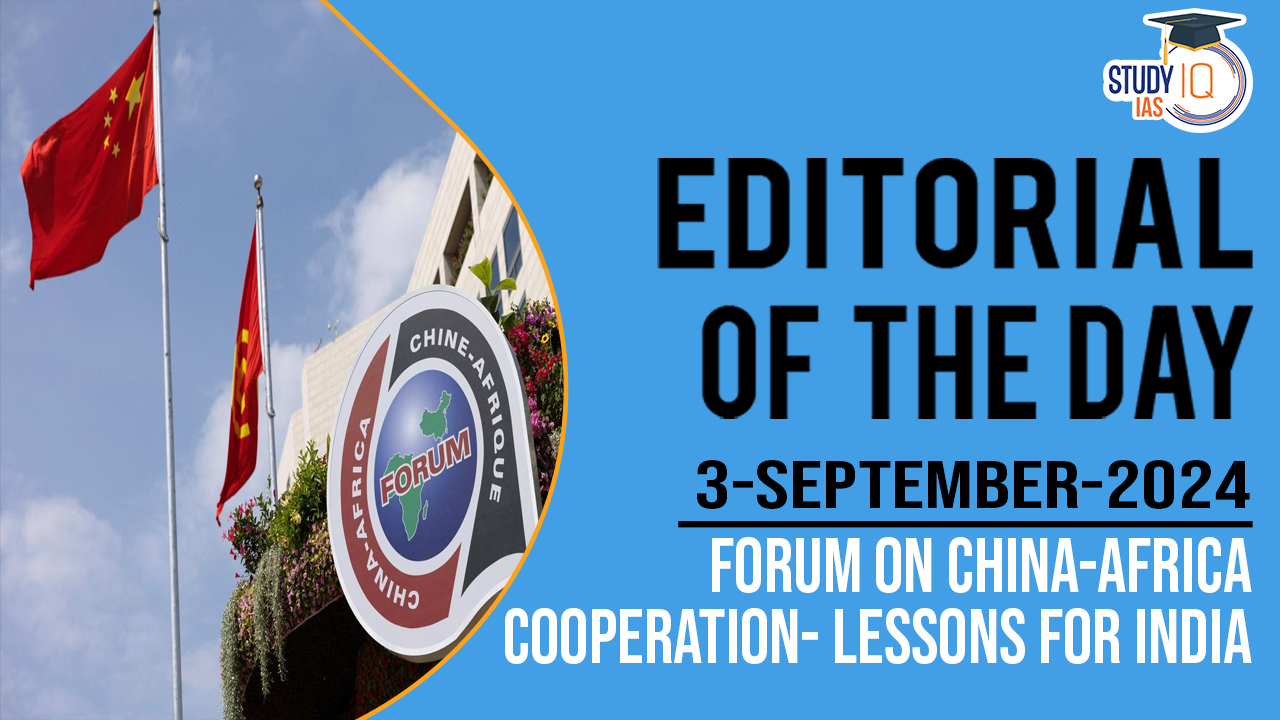Table of Contents
Context: The 9th edition of the Forum on China-Africa Cooperation (FOCAC) is scheduled to take place from September 4-6, 2024, in Beijing.
More in News
- African nations are grappling with multiple issues, including high inflation, currency depreciation, heavy debt burdens, unconstitutional military takeovers, and geopolitical challenges (such as the Israel-Hamas and Russia-Ukraine conflicts, along with attacks by Houthi rebels on commercial shipping in the Mediterranean Sea).
- There is also a sense of “summit fatigue” among African leaders due to numerous recent Africa+1 summits with countries like Türkiye, Russia, South Korea, and the U.S.
Centralization of Agenda and Knowledge Asymmetry
- The utility of the FOCAC process for Africa depends on Africa’s ability to set the agenda and take ownership of its strategic thinking.
- A significant knowledge asymmetry exists, with extensive Chinese strategies and papers on Africa, while African strategies on China are lacking.
- This disparity is attributed to the limited capacities, expertise, and political will of African states to understand China and the Communist Party of China (CCP).
- The lack of cultural and linguistic expertise in Africa regarding China further constraints African agency, leading to a reactive stance in negotiations.
African Priorities at FOCAC 2024
- Economic Front: Progress on Beijing’s goal to import $300 billion worth of goods from African countries between 2022-24 has been modest.
- From January to July 2024, China-Africa trade increased to $167 billion, with Chinese exports at $97 billion and African exports at $69 billion.
- About two-thirds of this trade involves raw materials.
- Developing a sustainable and robust agricultural industry in Africa remains a challenge.
- Countries like China and India could support African agriculture by developing crops, fertilizers, and pesticides suited to African conditions and improving weather forecasting through satellite systems.
- From January to July 2024, China-Africa trade increased to $167 billion, with Chinese exports at $97 billion and African exports at $69 billion.
- Green Energy and Industrial Development: African countries are encouraging international partners to establish more refining and processing hubs.
- In Zimbabwe, Chinese companies are required to do basic lithium refining to move up the value chain.
- However, challenges such as chronic electricity shortages, lack of power generation, and significant environmental, social, and governance (ESG) costs hinder the ability to refine raw minerals locally.
China and African Debt
- Chinese loans to African governments and regional institutions amounted to around $170 billion between 2000-22.
- China is not the main creditor in Africa, accounting for 12% of Africa’s public and private debt.
- Concerns over Chinese lending patterns include opacity, lack of transparency, and non-disclosure clauses.
- Despite these issues, China is unlikely to cancel or forgive debts, though it may write off small, interest-free loans.
Lessons for India
- Continuity in Engagement: India should emphasise continuity in its engagement with Africa, considering the last India–Africa Forum Summit (IAFS) was held in 2015.
- To capitalise on the momentum from the inclusion of the African Union in the G-20.
- India must hold IAFS-IV at the earliest and consider setting up an India-African Union Track 1.5 Dialogue.
- Integration into Global Value Chains: India can play a central role in integrating African economies into global value chains and supporting industrialization.
- Indian companies should invest in sectors like agriculture, pharmaceuticals, and manufacturing, setting up manufacturing bases in African countries to create employment and serve local markets.
- Investments in farm mechanisation, food processing, irrigation, and cold storage infrastructure are crucial to prevent food wastage and promote ‘Triple A’ (affordable, appropriate, and adaptable) technologies.
- Innovative Financing Solutions: India should encourage greater private sector participation and find innovative financing solutions, including public-private partnerships and blended finance.
- Indian banks and entrepreneurs need support with low-cost credit to conduct feasibility studies and create bankable projects.
- Technology Use: India’s digital stack (including UPI and RuPay services) could help establish digital and physical connectivity with Africa.
- To reduce forex risk, India should promote rupee-based lines of credit instead of dollar-based ones, as African nations lose billions of dollars annually in exchange rates.
Conclusion
- African countries are increasingly taking ownership of their strategic thinking and are repositioning the continent as an investment destination.
- By observing how African leaders engage and negotiate with China under FOCAC, India can derive valuable lessons to enhance its own partnership with Africa.


 Places in News for UPSC 2025 for Prelims...
Places in News for UPSC 2025 for Prelims...
 New Phase of Operation Chakra to Combat ...
New Phase of Operation Chakra to Combat ...
 Soyuz Aircraft: History, Design and Sign...
Soyuz Aircraft: History, Design and Sign...





















